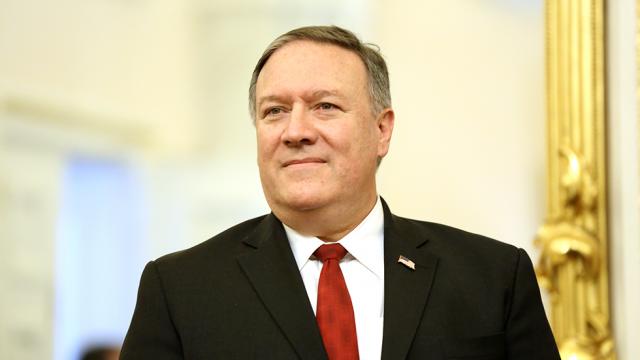In an exclusive telephone interview with CNN to mark his first two months in office, Pompeo said he wanted to see continued progress toward North Korean denuclearization, a promise leader Kim Jong Un made to President Donald Trump at their June 12 summit in Singapore.
But the top US diplomat, Trump's point man on North Korea, declined to set a deadline by which he wanted to see the Democratic People's Republic of Korea make visible steps toward that goal.
Pompeo has said in the past that he wanted to see full North Korean denuclearization before the end of Trump's first term in 2020.
"High level war games"
"I am not going to put a timeline on it, whether that's two months, six months, we are committed to moving forward in an expeditious moment to see if we can achieve what both leaders set out to do," Pompeo said, but added he would "constantly reassess" whether enough progress is being made to continue negotiations.
"We hope that we will have an ongoing process of making progress," Pompeo said Sunday.
Referring to Trump's decision to suspend US military exercises in the region, Pompeo said that "the President was clear. Each of the actions we have taken, his decision to suspend the high level war games, it's only so long as there is a good faith negotiation progress, productive results being achieved. If we can't do that, if it turns out that there is no capacity to deliver the outcome that both presidents said they wanted, yeah, we reassess."
This weekend the Pentagon announced the formal suspension of major joint military exercises with South Korea, but said in a statement that "additional decisions will depend upon the DPRK continuing to have productive negotiations in good faith" with Pompeo.
Separately, North Korea announced that it would soon return some 200 sets of remains to the United States, believed to be that of American servicemen who died during the Korean War.
Senior administration officials said that Pompeo was seeking an early meeting with his North Korean counterpart to begin discussions about next steps. His refusal to put a timeline on North Korean denuclearization contrasted sharply with comments from a senior defense official who briefed reporters ahead of a trip by Secretary of Defense James Mattis to Asia.
"I think the way we are going to approach North Korea is we are going to have some data points pretty soon if they are operating in good faith or not," the official said. "Secretary Pompeo has talked about an early engagement with North Korea. That's going to be worked on. We'll be able to present them with, my words, we'll know pretty soon if they are going to operate in god faith."
The senior defense official added that, "There will be specific asks and there will be a specific timeline when we do present the North Koreans with our concept of what implementation of the summit agreement looks like."
Mixed messages
On Monday, Pentagon spokeswoman Dana White walked those comments back in a pair of tweets.
"DoD remains committed to supporting the ongoing diplomatic process with the DPRK, of which there is no specific timeline," White wrote.
"Any statements by DoD personnel regarding the DPRK are solely in reference to the military aspects of the negotiations," White added, mentioning the "indefinite suspension of major exercises or logistical support for the dignified transfer of remains."
The joint statement between Trump and Kim laid out broad principles about North Korea's commitment to denuclearize, but was short on specifics on how and when that would happen, or how Pyongyang would be rewarded by the United States for doing so.
Less than two weeks after the summit, Pompeo suggested it was too soon to expect a detailed roadmap after 40 years of tensions between the two countries. But he insisted that he found Kim "unequivocal" in his statements that he is prepared to denuclearize, a first for the North Korean regime.
"I will say that there are understandings that have been put together prior to the summit, some that took place when the president was in Singapore that I think put us on the right trajectory so that we can build out a framework for success," Pompeo said.
He said that framework couldn't be filled out without, Kim "making clear his intent to denuclearize," Pompeo said. "I heard it myself when I visited there as CIA director, I heard it myself when I visited Pyongyang as Secretary of State and I heard it again where there was a group together with the President and Chairman Kim."
He alluded to the rough outlines of an agreement in which North Korea gives up its nuclear weapons program in exchange for security guarantees and economic support.
"There always will be challenges and there is work to do, but none of this could have happened without the commitment of the two senior leaders," Pompeo said, "and so long as that commitment stays in place, the United States is prepared to do exactly what the president said, which is create a brighter future for North Korea and provide security assurances for the North Korean people."
More about:
















































